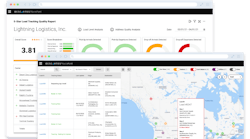BIRMINGHAM. Matt Voda knows there are a lot of regulations on the table right now for trucking. He also knows that many more will come down the road. That’s why Voda, vp of product management for PeopleNet, in speaking during a session at the McLeod Software Users’ Conference here yesterday delved into the CSA 2010 and hours-of-service rules and what fleets can do to prepare for them.
“We’re in a really rapidly evolving landscape,” he said. “There is a pretty significant pipeline of regs that started about five years ago and are all kind of hitting now, or in the next 18 to 24 months.”
Voda repeatedly stressed the importance of a fleet looking at its CSA data now and notifying FMCSA of needed changes. He also urged fleets to pay particular attention to the top ten violations, which include speeding, log violations, duty status violations, and not having a medical certificate, among others. Most of these, he said, are easily fixable.
“The top ten most frequent violations have a higher weight than they did before [due to changes to the reporting criteria in August],” Voda said. He added that about 82% of all violations are within one of these ten. In fact, 44% of those are related to hours-of-service violations alone.
“If you focus on the top ten from a business standpoint, from a technology standpoint, you’re going to do just fine,” he added. “You have got to know this data inside and out.”
So what can fleets do now? For one, inspect their records, Voda said.
And he said there are several other steps fleets can take to avoid CSA 2010 problems:
- Make an immediate assessment of your fleet
- Roll out a comprehensive compliance program
- Involve drivers and review all driver certifications and data
- Address problem drivers now
- Check safety data and correct errors
- Respond to all warnings issued to your fleet
- Institute an ongoing monitoring process
- Consider moving to an electronic onboard recorder (EOBR)
- Build up a “clean” inspection history going into 2011.
A big step in this process, according to Voda, is avoiding unnecessary inspections. Speeding could trigger an inspection ,which may turn up a bigger problem. Driver log violations, not having the proper medical certificates, poor vehicle maintenance and improper load securement are all things that are avoidable with proper attention but could result in additional problems for the fleet.
Voda highlighted the role EOBRs can play as well, saying that 60% of the PeopleNet customer fleets that use an EOBR showed improvement over those that did not. Because the CSA program will measure a fleet’s profile against its peers, those not having EOBRs may face unnecessary scrutiny.
“When you are scored against your peers and your peers have EOBRs and you don’t, you’re at a disadvantage,” Voda said.


